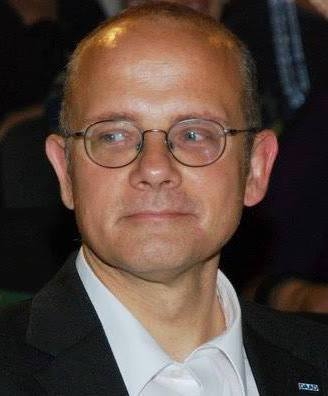1. The article "NATO-Russia War: A Possible Scenario" published on "Atlantic Community" (AC) at click here on 19 February 2009 is an abridged, re-titled, somewhat edited and unauthorized text with which I am not entirely happy. The full version can be found here: click here . The text was originally submitted under the title "The Unpopular Prospect of World War III: The 20th Century Is Not Over Yet." A slightly cut Russian version was just published here: http://www.apsny.ge/analytics/1235760967.php . For further discussion of that article see: http://www.cdi.org/russia/johnson/2009-19-49.cfm .
2. Mr. Nikiforov's vitriolic comments on the AC version of the article like Mr. Akishkin's texts on "Atlantic Community" before are valuable in that they illustrate the point of my argument: Western and Russian public opinion on crucial issues in the assessment of the contemporary world have drifted so far apart that a new Cold War seems possible. (Of course, such a new Cold War would be different from the classical one, but, perhaps, not less dangerous. One may also add that the concept of "cold war" is far older than the confrontation of 1945-1987, and goes back to ancient times.)
3. The main problem that I seem to have in communicating, in the West, the viciousness of anti-Westernism in today Russia is, apparently, that many Western international affairs analysts do not know Russian or/and do not watch Russian state-controlled TV. They, perhaps, watch only the English-language "Russia Today" channel the news reporting and analysis of which is different, in tone, style and substance, from the massive political propaganda transmitted around the clock by the major Russian TV channels ORT and RTR. Many Westerners tend to mainly communicate with the doubtlessly existing pro-Western sections of Russia's elite. They pay inordinate attention to such outlets as "Novaia gazeta" or "Ekho Mosky" that, however, reach only limited audiences, in Russia. As a result, these observers have – such is my impression – no full picture of what is today happening in Russian mass media, on a daily basis. For years now, the Western and especially the US political as well as intellectual elites have been portrayed by Russian journalists, pseudo-scholars, pundits etc. as a bunch of scoundrels whose every word needs to be understood as a purposeful lie, and whose only craving is to destroy, rip apart, or, at least, humiliate Russia. I suspect, therefore, that many of my critics would – after two weeks of watching Russian news and political shows at ORT and RTR – more or less agree with my worries about the future of Russian-Western relations.
4. International wars do not necessarily, like in the case of World War II, happen because one or several countries expressly want to go to war, at the outset. As the pre-history of the Crimean War of 1853-1856 (once described as the first "modern" conflict) illustrates, wars can also come about because of an escalation of tensions between countries that, originally, were not planning to fight each other. I am afraid that the beautiful peninsula of Crimea could, in the near future, again become the subject of such an escalation between Russia and the West concerning the sovereignty of Ukraine. For the background, see for instance the analyses by Taras Kuzio of this issue, in his book on Crimea (click here ) and in an article for "Jane's Intelligence Review" at click here .
5. Obviously, my speculation about World War III was meant to be a provocation. As I see it, I have, however, merely spoken out aloud what, at least, some Russia-watchers who spare the time to watch Russian TV may have been thinking too, for some time now. As Nikolai Berdiaev once wrote, the predictions of a "prophet" (which is, of course, not a term I would like to be associated with) do not necessarily have to come true – they only warn about a possible future.
6. Contrary to the impression that some readers at AC may have gotten, I think NATO bears responsibility for the current problems, in Russian-Western relations. I have outlined my assessment of the decision to preserve and expand NATO a few years ago in German in a review article available at: click here
I am, obviously, also not a fan of the Bush, Jr. administration and its policies in Eastern Europe as well as the former Soviet Union, as documented, for instance, here: click here .
7. I am not sure that the frequent economic turn in Western discussions of Russia's interest and policies – above all, of issues in her export of energy – is that helpful. Perhaps, it even reflects a Eurocentric, economistic bias in these commentators' view of the world. My impression during the Russia's last conflicts with Ukraine, Georgia and other countries is that purely commercial considerations play an only limited role in the formation and conduct of Moscow's international behaviour. During the last stand-off with Ukraine, Russia lost apparently millions of dollars and a lot of trust in Central and Eastern Europe. For an adequate explanation for such apparently unconstructive policies, one would seem to need more than economic analysis. See, for instance, the important accounts, in "Eurasia Daily Monitor" (vol. 6, no. 10, 16 January 2008), of Roman Kupchinsky at click here and of Taras Kuzio at click here . My own "Russia Profile" comment on the January 2009 Russian-Ukrainian gas conflict was re-published by the "Kyiv Post" here: http://www.kyivpost.com/opinion/33264 . Something similar can be said about Russia's August 2008 Georgia adventure. See http://www.americanchronicle.com/articles/view/75203 .
I look forward to further comments and rebuttals.





